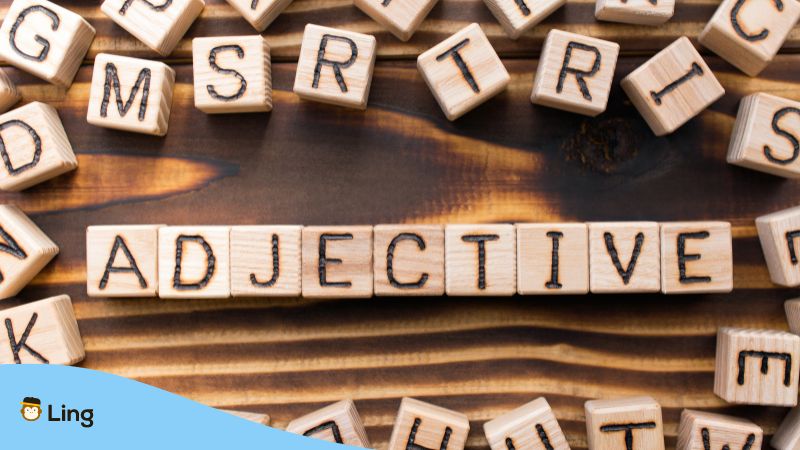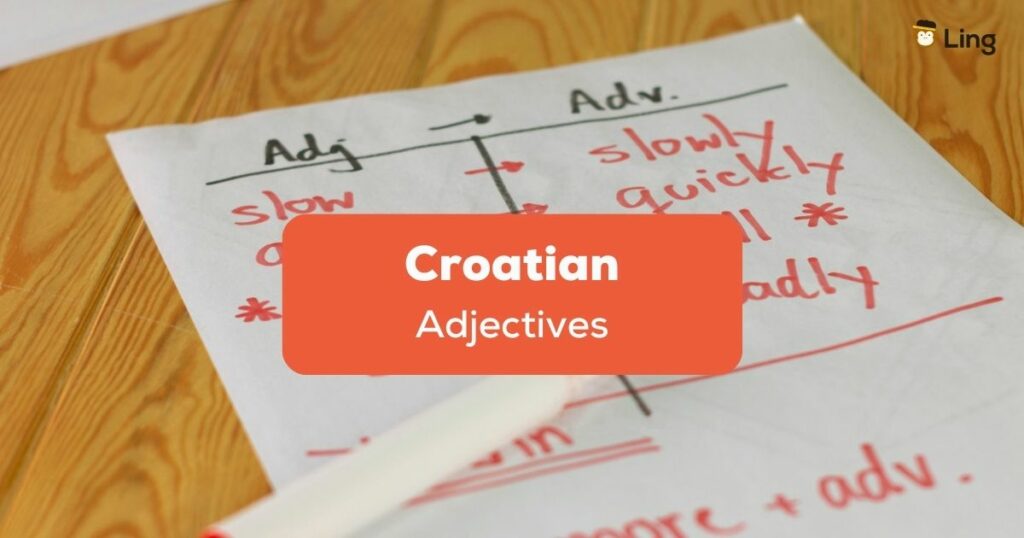Have you ever found yourself struggling to describe the perfect summer day on those beautiful Croatian beaches or to paint a picture of the stunning city of Dubrovnik? Or maybe you’re just starting to learn Croatian, and you’ve realized that adjectives are kind of a big deal. Fear not, my friend! We’ve got you covered with our easy-to-follow guide on mastering Croatian adjectives.
So, are you ready to boost your Croatian to the next level? If your answer is “Heck yes!” read on!
Understanding Croatian Adjectives
Let’s start with the basics. Adjectives are those handy words in our sentences that describe or modify other words, usually nouns. Think words like beautiful, cold, happy, yellow – yes, these are all adjectives!
In the Croatian language, just like in English, adjectives pop up everywhere. They come in handy when describing that prekrasna (beautiful) sunset you saw on your last trip to Croatia, or the hladno (cold) breeze you felt right when you stepped off the plane. Easy enough, right?
However, it’s not as simple as mere “translation,” though. A fascinating thing to keep in mind is that – unlike English – Croatian adjectives can change their form based on gender, number, and case. Yes, it may sound a bit intimidating at first. But don’t worry; we’re in this together, and I promise it is not as complex as it seems!
Croatian Vs English Adjectives: The Key Differences And Similarities
So, you’ve been learning Croatian and doing a fantastic job! But when it comes to adjectives, let’s face it – they can be a bit confusing. How do they compare to their English counterparts? Let’s face it head-on and discover the key differences and similarities between Croatian and English adjectives.
Gender
While Croatian and English adjectives have some similarities (like they both modify nouns), there are also some notable differences. In English, adjectives don’t change their form, no matter where you place them. The blue sky, a blue shirt, and feeling blue – see, the adjective blue remains the same.
On the flip side, in Croatian, an adjective is rather versatile and changes based on the noun it’s modifying. For instance, there are three genders of adjectives:
- Masculine adjectives: Used with masculine nouns
- Feminine adjectives: Used with feminine nouns
- Neuter adjectives: Used with neutral nouns
For example, say we use the adjective velik (big). If we are referring to a big cup (which is a masculine noun), we say velik šalica. A big house (which is feminine gender), on the other hand, becomes velika kuća.
Strange and exciting, right? Yes, it’s a little extra brain workout. But once you get the hang of it, you’ll be tossing around Croatian adjectives like a true native speaker!

Number
In both Croatian and English, adjectives come in singular and plural forms, but there’s a twist. In English, adjectives stay the same regardless of the number of nouns they describe.
But when it comes to the Croatian language, things are a bit different! Adjectives change in Croatian not only based on the noun’s gender, but also on its number (whether it’s singular or plural). Let’s say you have the word sretan (happy) in Croatian:
- Pas je sretan (The dog is happy)
- Psi su sretni (The dogs are happy)
In Croatian, the adjective sretan goes from singular (sretan) to plural (sretni) when describing more than one dog. The plural endings are different from the singular ones.
Long And Short Forms Of Adjectives
Croatian adjectives come in two specific forms: long and short forms. What’s the difference? It’s simple:
- Long forms are the ones you’ll use the most and are just the regular forms of adjectives. For example, sretan (happy) or lijepa (beautiful).
- Short forms are used in more informal situations or when you want to save some space. They’re just like the long forms but with a tiny tweak at the end. For example, sretan becomes sret’n, and lijepa becomes ljepa.
Comparative And Superlative Forms
Want to compare things and express who’s the best, the tallest, or the happiest? Croatian has two special forms of adjectives for that, called comparative and superlative.
- Comparative is used to compare two things. Just add the adjective ending -iji or -je, depending on the adjective. For example, stariji (older) or ljepše (more beautiful).
- Superlative is used to say something is “the most” or “the best.” You just need to add the word naj- in front of the adjective. For example, najstariji (the oldest) or najljepša (the most beautiful).
Types Of Adjectives
Every language carries its own unique charm, and Croatian is no different. Just like spices in a delightful Croatian dish, adjectives add that essential dollop of excitement and zest to every sentence. Now, let’s dive right in!
Descriptive Adjectives
These are the adjectives we encounter all the time – they’re the words we use to describe the world around us. Think about how you’d describe a sunny day, your favorite food, or even your best friend’s personality. Fun, right? In Croatian, you’ll find these adjectives to be just as delightful, helping you paint vivid pictures with your words.
Possessive Adjectives
Now, let’s get personal – possessive adjectives show ownership or relationships between people, things, and ideas. These adjectives are incredibly handy when you want to say something belongs to someone or express a personal connection.

Common Croatian Adjectives
Here’s a handy-dandy list of basic adjectives in Croatian paired with their English translation. Keep this close while you practice!
| English | Croatian | Pronunciation |
|---|---|---|
| Big | Velik | |
| Small | Mali | |
| Old | Star | |
| New | Nov | |
| Long | Dug | |
| Short | Kratak | |
| Beautiful | Lijep | |
| Ugly | Ružan | |
| Hot | Vruć | |
| Cold | Hladan | |
| Fast | Brz | |
| Slow | Spor | |
| Good | Dobar | |
| Bad | Loš | |
| Happy | Sretan | |
| Sad | Tužan |
You’re A Croatian Adjective Master!
Yes, Croatian adjectives may seem a bit tricky at the beginning, but now you’ve got the hang of them. Look at you, getting cozy with Croatian grammar rules. Next time you decide to pay a visit to the stunning city of Dubrovnik or the Plitvice Lakes National Park, you’ll be impressing locals with your eloquent language skills.
Learn Croatian With Ling
Why not dive into a global adventure with the Ling app? Go from ‘hello’ to having full conversations in any language and making connections all around the world!
To start your journey towards language mastery, download the Ling app now and unlock a universe of languages at your fingertips!
Download now on the App Store or Play Store!



































































